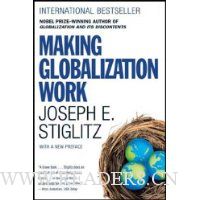Making Globalization Work
基本信息·出版社:W.W. Norton & Co. ·页码:400 页 ·出版日期:2007年09月 ·ISBN:0393330281 ·条形码:9780393330281 ·装帧:平装 ·正文语种:英 ...
| 商家名称 |
信用等级 |
购买信息 |
订购本书 |
|
|
 |
Making Globalization Work |
 |
|
 |
Making Globalization Work |
 |

基本信息·出版社:W.W. Norton & Co.
·页码:400 页
·出版日期:2007年09月
·ISBN:0393330281
·条形码:9780393330281
·装帧:平装
·正文语种:英语
·外文书名:世界的另一种可能
内容简介 "A damning denunciation of things as they are, and a platform for how we can do better."--Andrew Leonard, Salon Four years after he outlined the challenges our increasingly interdependent world was facing in Globalization and Its Discontents, Joseph E. Stiglitz offered his agenda for reform. Now in paperback, Making Globalization Work offers inventive solutions to a host of problems, including the indebtedness of developing countries, international fiscal instability, and worldwide pollution. Stiglitz also argues for the reform of global financial institutions, trade agreements, and intellectual property laws, to make them better able to respond to the growing disparity between the richest and poorest countries. Now more than ever before, globalization has gathered the peoples of the world into one community, bringing with it a need to think and act globally. This trenchant, intellectually powerful book is an invaluable step in that process. This paperback edition contains a brand-new preface.
作者简介 Joseph E. Stiglitz of Columbia University is the author of
Making Globalization Work and
Globalization and Its Discontents. He was chairman of President Clinton's Council of Economic Advisers and served as senior vice president and chief economist at the World Bank. He received the Nobel Memorial Prize in Economics in 2001.
编辑推荐 From Booklist Stiglitz's seminal
Globalization and Its Discontents (2002) argued that globalization has not benefited as many people as it could, a failure attributable to structural flaws in international financial institutions as well as limited information and imperfect competition. With this selection, the Nobel Prize-winning economist suggests a host of solutions by which globalization can be "saved from its advocates" and made safe and worthwhile for the poor and rich alike. Each chapter examines, in some depth, an obstacle to equitable globalization (the burden of massive national debt, for example) and provides a set of possible solutions (a return to countercyclical lending and development of international bankruptcy laws, for example). Many of Stiglitz's proposals echo the familiar litanies of developing nations in the Doha round of international trade talks, but several, such as those drawing upon East Asia's experiments in contained progress, are innovative enough to warrant books of their own. Fairly accessible for a work of macroeconomics, this is a worthy counterpoint to Thomas Friedman's popular
The World Is Flat (2005).
Brendan DriscollCopyright © American Library Association. All rights reserved --This text refers to the Hardcover edition. Review A well-written and informative primer on the major global economic problems. ... [Stiglitz] helps his readers understand exactly what is at stake. (Jeffry Frieden -New York Times Book Review )
--This text refers to the Hardcover edition.




